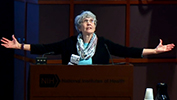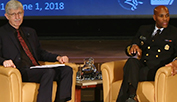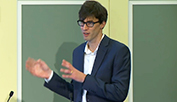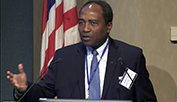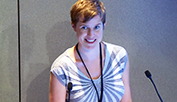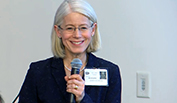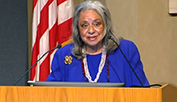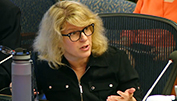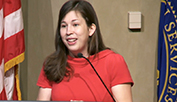-
- NIH VideoCast - BRAIN Initiative Multi-Council Working Group Meeting - May 2018
-
- - NINDS, NIH (2018/06/06)
- - Category : National Institute of Neurological Disorders and Stroke
- The purpose of this meeting is to receive feedback on funding opportunity announcements, incoming applications, and strategic planning for the NIH component of the BRAIN Initiative. This is the eighth meeting of the Multi-Council Working Group. The MCWG is comprised of representatives from the 10 participating BRAIN Institutes/Centers, at-large members, and federal ex officio representatives from other participating federal agencies.
For more information go to https://braininitiative.nih.gov/about/mcwg.htm
NIH VideoCast - BRAIN Initiative Multi-Council Working Group Meeting - May 2018
-
- NIH VideoCast - Accelerating Rural Cancer Control Research Meeting (Day 1)
-
- - Division of Cancer Control and Population Sciences, NCI, NIH (2018/06/06)
- - Category : Conferences
- The Accelerating Rural Cancer Control Research (ARCC) Meeting aims to identify gaps in rural cancer control research and practice, build partnerships across various stakeholder groups to address challenges and disseminate solutions, and to highlight and identify approaches to address shared and competing priorities of providers, health systems, researchers, patients, and communities.
For more information go to https://cancercontrol.cancer.gov/research-emphasis/meetings/arcc-meeting.html
NIH VideoCast - Accelerating Rural Cancer Control Research Meeting (Day 1)
-
- NIH VideoCast - Clinicopathologic Grand Rounds: Clinical Cases from the NIH Clinical Center: Disseminated and Congenital Toxoplasmosis: When Immune Mechanisms of Control Go Awry
-
- - 1) Djuro Karanovic, MD, Clinical Fellow; Laboratory of Clinical Immunology and Microbiology, NIAID, NIH 2) Gulbu Uzel, MD, Staff Clinician, Laboratory of Clinical Immunology and Microbiology, NIAID, NIH 3) Luigi D. Notarangelo, MD, Head, Immune Deficiency Genetics Section; Chief, Laboratory of Clinical Immunology and Microbiology, NIAID, NIH (2018/06/06)
- - Category : Clinical Center Grand Rounds
- Clinicopathologic Grand Rounds: Clinical Cases from the NIH Clinical Center: Disseminated and Congenital Toxoplasmosis: When Immune Mechanisms of Control Go Awry
For more information go to https://www.cc.nih.gov/about/news.html
NIH VideoCast - Clinicopathologic Grand Rounds: Clinical Cases from the NIH Clinical Center: Disseminated and Congenital Toxoplasmosis: When Immune Mechanisms of Control Go Awry
-
- NIH VideoCast - Sounding the Alarm and Putting Out the Fire: New Mechanistic Insights into Inflammation Triggered by Invasive Infection
-
- - Judy Lieberman, M.D., Ph.D., Chair in Cellular and Molecular Medicine, Program in Cellular and Molecular Medicine, Boston Children`s Hospital; Professor of Pediatrics, Harvard Medical School (2018/06/06)
- - Category : WALS - Wednesday Afternoon Lectures
- NIH Director???s Wednesday Afternoon Lecture Series
The Lieberman laboratory has been in the forefront of developing RNAi-based therapeutics and using RNAi for genome-wide screening. The lab was the first to demonstrate that siRNAs could protect mice from disease. Dr. Lieberman and her lab developed methods to harness RNAi to inhibit herpes and HIV transmission in animal models. They have developed strategies for cell-targeted RNAi to treat viral infection, immune disease, and cancer. They are currently investigating tumor-targeted siRNAs for immunotherapy to activate tumor expression of neoantigens and avoid autoimmune side effects of checkpoint inhibitors. The lab is also investigating the role of endogenous microRNAs and lncRNAs in regulating cell differentiation and cancer.
In particular, Dr. Lieberman and her colleagues study cytotoxic T lymphocytes and their role in infection and tumor immunity. Her lab investigates the molecular pathways used by killer lymphocytes and their cytotoxic granule proteases (granzymes) and pore-forming proteins (perforin and granulysin) to induce programmed cell death. The lab has defined a caspase-independent programmed-cell-death pathway activated by granzyme A. Recent work has identified an unexpected role for granzymes and granulysin: protecting against bacteria and parasites. Dr. Lieberman and her lab recently uncovered the molecular basis for inflammatory cell death (pyroptosis) triggered by invasive bacteria and other danger signals. They found that the inflammatory caspase-cleaved protein (gasdermin D) causes cell death due to the formation of membrane pores. This mechanism also directly kills the bacteria that trigger the inflammasome. Current work focuses on innate and adaptive immune responses to invasive pathogens, including bacteria, malaria, other parasites, and fungi, including the role of decidual natural killer cells in protection against infection in pregnancy.
This Khoury lecture was organized by NIH scientists to honor the memory of cancer virologist George Khoury, M.D., who was highly regarded as a superb scientist and caring mentor of the postdoctoral fellows in his laboratory. Dr. Khoury, former chief of the Laboratory of Molecular Virology at the National Cancer Institute, was known for his instinctive inquisitive nature, unfaltering kindness, self-giving mentorship, and exceptional science.
For more information go to https://oir.nih.gov/wals
NIH VideoCast - Sounding the Alarm and Putting Out the Fire: New Mechanistic Insights into Inflammation Triggered by Invasive Infection
-
- NIH VideoCast - Regulating Autoimmunity and Autoinflammation: Cytokine blockade and beyond
-
- - Richard Siegel, M.D., Ph.D, NIAMS, NIH (2018/06/06)
- - Category : Immunology
- Immunonology IG Seminar
Richard Siegel`s interest in immunology and apoptosis began in the late 1980`s at the University of Pennsylvania School of Medicine where he was an M.D., Ph.D. student. Working with Mark Greene and John Reed, he studied the influence of bcl-2 on T cell apoptosis and repertoire selection. He trained in Internal Medicine and Rheumatology at Hospital of the University of Pennsylvania, and moved to the NIH in 1996 to do postdoctoral training with Michael Lenardo in the Laboratory of Immunology in the National Institute of Allergy and Infectious Disease. There he studied apoptosis signaling and the molecular basis of its impairment in patients with inherited mutations in Fas/CD95 and the Autoimmune Lymphoproliferative Syndrome (ALPS). In 2001, Dr. Siegel moved to NIAMS as a tenure-track investigator. His current research interests include regulation of cellular survival and death in the immune system by TNF receptor and other signaling pathways, and the relevance of these pathways to autoimmune diseases and immune tolerance. He is a member of the American Society of Clinical Investigation and serves on the editorial board of the Journal of Biological Chemistry.
NIH VideoCast - Regulating Autoimmunity and Autoinflammation: Cytokine blockade and beyond
-
- NIH VideoCast - Accelerating Rural Cancer Control Research Meeting (Day 2)
-
- - Division of Cancer Control and Population Sciences, NCI, NIH (2018/06/06)
- - Category : Conferences
- The Accelerating Rural Cancer Control Research (ARCC) Meeting aims to identify gaps in rural cancer control research and practice, build partnerships across various stakeholder groups to address challenges and disseminate solutions, and to highlight and identify approaches to address shared and competing priorities of providers, health systems, researchers, patients, and communities.
For more information go to https://cancercontrol.cancer.gov/research-emphasis/meetings/arcc-meeting.html
NIH VideoCast - Accelerating Rural Cancer Control Research Meeting (Day 2)
-
- NIH VideoCast - 13th Annual Pain Consortium Symposium: At the Intersection of Pain Management and the Opioid Crisis (Day 1)
-
- - NIH (2018/06/06)
- - Category : Conferences
- The NIH Pain Consortium sponsors an annual symposium on a significant topic relevant to pain. This symposium features NIH supported researchers whose work has made an important contribution to pain research. In addition to speakers and panel sessions, there is a poster session featuring early career investigators. Researchers with the best abstracts are selected to give an oral presentation, and the best presenter receives the Mitchell Max Award for Best Poster.
For more information go to https://painconsortium.nih.gov/Meetings_Events/Annual_Symposium
NIH VideoCast - 13th Annual Pain Consortium Symposium: At the Intersection of Pain Management and the Opioid Crisis (Day 1)
-
- NIH VideoCast - Molecular simulation tools for investigating structure and dynamics of intrinsically disordered proteins
-
- - Robert Best, Ph.D., Senior Investigator, Laboratory of Chemical Physics, NIDDK, NIH (2018/06/06)
- - Category : NIH Director`s Seminars
- Director`s Seminar Series
Dr. Robert Best`s research is concerned with the dynamics of large biomolecules and in particular with protein dynamics, folding, and misfolding. Novel simulation and theoretical methods are developed as needed to address specific problems. A strong emphasis is placed on making a connection with experiment, both in using experimental data to help improve simulation methodology or sampling, and simulations as a tool to assist the interpretation of results.
Recent work has focused on the following:
The optimization of protein force fields using empirical data for peptides and macromolecules in solution; interpretation of single-molecule fluorescence or pulling experiments using simulation and theory; coarse-grained master equations as a tool for interpreting peptide dynamics in simulations; diffusion models of protein folding; the binding mechanism of intrinsically disordered proteins; the influence of molecular chaperonins on folding and misfolding; the mechanism of substrate transport in hydrogenase enzymes; and methods for identifying cryptic binding pockets in proteins.
NIH VideoCast - Molecular simulation tools for investigating structure and dynamics of intrinsically disordered proteins
-
- NIH VideoCast - Caring for our Military: Considering Nondrug Therapies for Pain
-
- - Mary Jo Larson, Ph.D., M.P.A., Senior Scientist, The Heller School for Social Policy and Management, Brandeis University (2018/06/06)
- - Category : National Center for Complementary and Integrative Health
- The National Center for Complementary and Integrative Health (NCCIH) presents:
Caring for our Military: Consider Nondrug Therapies for Pain
There has been a recent trend toward a culture of pain awareness within the U.S. military that includes expanded use of nondrug treatments and a full continuum of best-practice pain services. These changes are aligned with the report of the Pain Management Task Force convened in 2009 by the U.S. Army Surgeon General, which provided more than 100 recommendations on a holistic, multidisciplinary, and multimodal strategy to manage pain.
Mary Jo Larson, Ph.D., M.P.A., will provide an overview on pain treatment, including recent innovations, in the U.S. Military Health System. Dr. Larson will also discuss her research study funded by NCCIH on the characteristics and clinical needs of U.S. Army soldiers returning from deployments, the types of treatments (drug and nondrug) they receive, and the associated outcomes.
During this lecture Dr. Larson will:
1. Identify at least three recent innovations in the Military Health System to improve the care of patients with pain.
2. Describe the evolution from 2009 to 2014 of health care utilization among soldiers treated for pain.
3. Describe several results of studies on integrative care modalities in relation to outcomes relevant to the military.
Dr. Larson is a senior scientist at the Heller school for Social Policy and Management at Brandeis University. She has devoted her career to research on improving health care systems. She holds a Ph.D. with a concentration in mental health services research from the Heller School for Advanced Studies in Social Welfare, Brandeis University, and an M.P.A. from the John F. Kennedy School of Government, Harvard University.
Her recent research involves studying systems that provide care for military members affected by behavioral health conditions or chronic pain, and their families. Her goal is to develop and evaluate interventions to improve access to effective care (e.g., by educating health care providers in the use of evidence-based treatment and to evaluate care costs and utilization under different service delivery models).
The funders of Dr. Larson???s research have included NCCIH, the National Institute on Drug Abuse, the National Institute on Alcohol Abuse and Alcoholism, the Substance Abuse and Mental Health Services Administration, and the U.S. Department of Defense. Her projects have included studies of military spouses and children, including health changes associated with a military member???s deployment, and development of a large, longitudinal database on the clinical/health services needs of U.S. soldiers who have returned from combat deployment. Dr. Larson served as a member of two committees of the National Academy of Medicine, which authored ???Substance Use Disorders in the U.S. Armed Forces??? and ???Preventing Psychological Disorders in Service Members and Their Families: An Assessment of Programs.???
For more information go to https://nccih.nih.gov/news/events/IMlectures
NIH VideoCast - Caring for our Military: Considering Nondrug Therapies for Pain
-
- NIH VideoCast - Beyond Transcriptomics: Understanding Erythrocyte Maturation
-
- - NIDDK, NIH (2018/05/31)
- - Category : Conferences
- Prior to nuclear extrusion from pronormoblasts, critical pathways are developed and continue functioning to ensure optimal erythrocyte function. Knowledge about individual gene products does not necessarily inform us about pathways/processes and their interactions. The purpose of this workshop is to explore these processes and to discuss metabolic reprogramming, proteostasis, integration of transcriptomics, proteomics and other -omics, and enucleation. Please join us in an open forum to discuss the state of the field and to identify gaps in our knowledge.
For more information go to https://www.niddk.nih.gov/news/meetings-workshops/2018/beyond-transcriptomics-understanding-erythrocyte-maturation
NIH VideoCast - Beyond Transcriptomics: Understanding Erythrocyte Maturation
-
- NIH VideoCast - National Advisory Neurological Disorders and Stroke (NANDS) Council - May 2018
-
- - National Institute of Neurological Disorders and Stroke, NIH (2018/05/30)
- - Category : National Institute of Neurological Disorders and Stroke
- The 202nd meeting of the National Advisory Neurological Disorders and Stroke Council on May 24, 2018.
For more information go to https://www.ninds.nih.gov/About-NINDS/Who-We-Are/Advisory-Council
NIH VideoCast - National Advisory Neurological Disorders and Stroke (NANDS) Council - May 2018
-
- NIH VideoCast - NIH Alzheimer`s Disease Research Summit 2018
-
- - National Institute on Aging, NIH (2018/05/30)
- - Category : Conferences
- The 2018 NIH AD Research Summit will bring together researchers and opinion leaders from academia, industry, federal agencies, private foundations and public advocacy groups working on Alzheimer`s and other complex diseases with the goal to evaluate progress towards the AD research implementation milestones and to continue the development of an integrated, multidisciplinary, translational research agenda necessary to address critical knowledge gaps and enable precision medicine for AD. Key to achieving this goal is the identification of: 1) resources/infrastructure and multi-stakeholder partnerships necessary to successfully implement this research agenda and 2) strategies to engage patients, caregivers and citizens as direct partners in research.
This key strategic planning event is tied to the implementation of the first research goal of the National Plan to Address Alzheimer`s (NAPA), to treat and prevent Alzheimer`s disease by 2025. The 2018 Summit builds on the foundation laid by the NIH AD Research Summits held in 2012 and 2015 and the NIH ADRD Research Summits of 2013 and 2016.
The meeting program will be organized around 7 major themes/sessions:
Novel Mechanistic Insights into the Complex Biology and Heterogeneity of AD
Enabling Precision Medicine for AD
Translational Tools and Infrastructure to Enable Predictive Drug Development
Emerging Therapeutics
Understanding the Impact of the Environment to Advance Disease Prevention
Advances in Disease Monitoring Assessment and Care
Building an Open Science Research Ecosystem to Accelerate AD Therapy Development
Each session will feature progress achieved towards key research implementation milestones and highlight emerging research trends, followed by a moderated panel discussion focused on outstanding questions/knowledge gaps/research needs.
The general program will be followed by a writing session during which a select group of experts together with NIA/NIH staff and NAPA Council members will evaluate progress to date and formulate recommendations which will be used as the basis for updating and refining the research implementation milestones for measuring progress towards the goal to prevent and treat AD by 2025.
NIH VideoCast - NIH Alzheimer`s Disease Research Summit 2018
-
- NIH VideoCast - ICCVAM Public Forum - May 2018
-
- - Interagency Coordinating Committee on the Validation of Alternative Methods (2018/05/30)
- - Category : Conferences
- ICCVAM???s goals include promotion of national and international partnerships between governmental and nongovernmental groups, including academia, industry, advocacy groups, and other key stakeholders. To foster these partnerships ICCVAM holds annual public forums to share information and facilitate direct communication of ideas and suggestions from stakeholders. This year???s meeting will include presentations by NICEATM and ICCVAM members on current activities related to the development and validation of alternative test methods and approaches, including activities relevant to implementation of the strategic roadmap for establishing new approaches to evaluate the safety of chemicals and medical products in the United States.
This meeting is open to the public; interested persons may attend in person or view the meeting remotely by webcast. Those attending in person should register to attend by May 11 and review information for visitors on the National Institutes of Health website. Registration to view the webcast is required and will be available through the end of the meeting on May 24. Time will be set aside for questions and public statements on the topics discussed. Attendees need not register in advance for the opportunity to ask questions or make comments specific to presentations. In addition to time for questions or comments following each scheduled presentation, time will be allotted during the meeting for oral public statements with associated slides on topics relevant to ICCVAM???s mission. Persons wishing to present oral public statements should email their statement to ICCVAMquestions@niehs.nih.gov by May 11.
For more information go to https://ntp.niehs.nih.gov/go/iccvamforum-2018
NIH VideoCast - ICCVAM Public Forum - May 2018
-
- NIH VideoCast - National Advisory Dental and Craniofacial Research Council - May 2018
-
- - NIDCR, NIH (2018/05/30)
- - Category : National Advisory Dental and Craniofacial Research
- The mission of the National Institute of Dental and Craniofacial Research (NIDCR) includes the support of basic, clinical and translational research as well as the support of research training and the development of research careers. To help achieve the goals of the NIDCR, the National Advisory Dental and Craniofacial Research Council (NADCRC) has the responsibility of advising, consulting with and making recommendations to the Secretary, DHHS, and the Director, NIDCR, on matters relating to the directions of research, research support, training and career development supported by the Institute. Included in this responsibility is the conduct of the secondary review of research grant applications with a focus on NIDCR scientific program priorities and program balance as well as the conduct of research by the Division of Intramural Research, NIDCR.
NIH VideoCast - National Advisory Dental and Craniofacial Research Council - May 2018
-
- NIH VideoCast - NIGMS Council Open Session - May 2018
-
- - NIGMS, NIH (2018/05/30)
- - Category : Advisory Board Meetings and Workshops
- This is the public broadcast of the NIGMS May 2018 Open Session Council
NIH VideoCast - NIGMS Council Open Session - May 2018
-
- NIH VideoCast - Third Annual NIH Vivian W. Pinn Symposium - 2018
-
- - Office of Research on Women???s Health, NIH (2018/05/25)
- - Category : Conferences
- To hear the voices of success of women in science, to provide opportunities for sharing lessons learned in various settings, to provide a platform for mentors to share their experiences in supporting women in science, and to provide networking opportunities.
NIH VideoCast - Third Annual NIH Vivian W. Pinn Symposium - 2018
-
- NIH VideoCast - National Advisory Council on Aging - May 2018
-
- - NIA, NIH (2018/05/25)
- - Category : Advisory Board Meetings and Workshops
- The National Advisory Council on Aging (NACA) advises the Secretary of the U.S. Department of Health and Human Services, the Director of NIH and the Director of the NIA on it`s mission. The Council meets three times a year to consider applications for research and training grants.
For more information go to https://www.nia.nih.gov/about/naca
NIH VideoCast - National Advisory Council on Aging - May 2018
-
- NIH VideoCast - Advancing population health: five propositions and a research agenda
-
- - Ana V. Diez Roux, M.D., Ph.D., M.P.H., Dean and Distinguished University Professor of Epidemiology, Drexel University (2018/05/25)
- - Category : WALS - Wednesday Afternoon Lectures
- NIH Wednesday Afternoon Lecture Series
Annual Robert S. Gordon Jr. Lecture
Population health has emerged as a framework for research and action to improve health and reduce health inequities. For her lecture, Dr. Diez Roux will discuss what a population health approach means, posit five facts about population health and their implications for scientific understanding and policy, and highlight key components of a population health research agenda.
Dr. Diez Roux is internationally known for her research on the social determinants of health and the study of how neighborhoods affect health. Her work on neighborhood health effects has been highly influential in the policy debate on population health and its determinants. Her research areas also include environmental and psychosocial health effects, cardiovascular disease epidemiology, and the use of multilevel methods and complex systems approaches in population health. She has led large NIH and foundation funded research and training programs in the United States and in collaboration with partners in Latin America.
This annual lecture is named in honor of Robert S. Gordon Jr., former Assistant Surgeon General of the U.S. Public Health Service and Special Assistant to former NIH Director James Wyngaarden. Topics focus on clinical research and epidemiology. Speakers are selected by the NIH Office of Disease Prevention (ODP).
For more information go to https://oir.nih.gov/wals
NIH VideoCast - Advancing population health: five propositions and a research agenda
-
- NIH VideoCast - Immune deficiency with Immune dysregulation: Insights from the analysis of T cell repertoire diversity and composition
-
- - Luigi D. Notarangelo, MD, Chief, Laboratory of Clinical Immunology and Microbiology, NIAID, NIH (2018/05/25)
- - Category : Immunology
- Immunonology IG Seminar
Luigi D. Notarangelo is the Chief of the Laboratory of Clinical Immunology and Microbiology at NIAID. He graduated in Medicine at the University of Pavia (Italy) and completed residency in Pediatrics and fellowships in Allergy/Immunology and Human Genetics. Between 2000 and 2006, he was Professor and Chair of Pediatrics at the University of Brescia (Italy), then moved to Boston where he was Professor of Pediatrics at Harvard Medical School until 2016, when he moved to NIH. He is past-President of the European Society of Immune Deficiencies and of the Clinical Immunology Society. He has published 491 manuscripts. His major area of interest is in the characterization of the molecular and cellular bases of primary immune deficiencies, and combined immune deficiencies in particular, and in development of novel forms of therapy for these disorders. He has discovered the bases of human JAK3 deficiency, Omenn syndrome, X-linked thrombocytopenia, CD40 deficiency, DOCK2 deficiency, and EXTL3 deficiency. His studies currently focus on the identification of molecular signatures of immune dysregulation in the T cell repertoire of patients with primary immune deficiencies, and on development of less toxic approaches to opening of stem cell and lymphoid niches to facilitate engraftment of donor cells.
NIH VideoCast - Immune deficiency with Immune dysregulation: Insights from the analysis of T cell repertoire diversity and composition
-
- NIH VideoCast - Michael E. DeBakey Lecture in the History of Medicine - Transplanting Technology: Dr. Michael DeBakey and Cold War Technology Transfer
-
- - Heidi Morefield, MSc, 2017 NLM Michael E. DeBakey Fellow in the History of Medicine, Doctoral student, Department of the History of Medicine, The Johns Hopkins University (2018/05/25)
- - Category : History of Medicine
- 2nd Annual Michael E. DeBakey Lecture in the History of Medicine
At the height of the Cold War, Dr. Michael E. DeBakey, one of the most prolific American surgeons of the 20th century, made several trips to China and the USSR to survey the medical landscape on the other side of the Iron Curtain. DeBakey became a broker of valuable medical information, teaching new techniques and introducing new machines in the USSR and China, while reporting on the conditions of Chinese and Soviet medical institutions back home to the American public. His diplomatic success was possible in part because of his willingness to take less high-tech medical systems seriously???he praised the barefoot doctors and was ???impressed??? with Russian medical inventions that were showcased during his visits. With rich diary entries describing his visits, DeBakey understood medical technology as being appropriate only in context. He situated both the Western technology he helped transplant to the East as well as that which he encountered there within the topography of the Soviet and Chinese medical systems. In reflecting upon DeBakey???s Cold War travels, this talk will interrogate how his influence and mobility shaped perceptions of both American and communist-sphere medical technology
NIH VideoCast - Michael E. DeBakey Lecture in the History of Medicine - Transplanting Technology: Dr. Michael DeBakey and Cold War Technology Transfer








